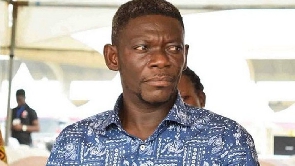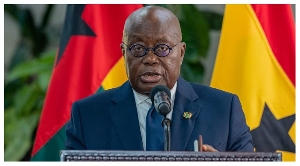- Home - News
- TWI News | TV
- Polls
- Year In Review
- News Archive
- Crime & Punishment
- Politics
- Regional
- Editorial
- Health
- Ghanaians Abroad
- Tabloid
- Africa
- Religion
- Election 2020
- Coronavirus
- News Videos | TV
- Photo Archives
- News Headlines
- Press Release
General News of Tuesday, 14 March 2006
Source: GNA
WAEC asked to build better public image
Accra, March 14, GNA - The West African Examination Council (WAEC), has been called upon to assert its capacity to prevent examination malpractices and build a more positive public image.
Prof Ivan Addae-Mensah, former Vice Chancellor of the University of Ghana, said the WAEC had not scored a very positive image because of the occasional high profile cases of malpractices in the past - and also because Council had not engaged the public effectively to make it understand the nature of its work.
He was delivering the 11th WAEC Endowment Lecture in Accra. It was on the theme: "Quality Assurance in Public Examinations". Prof Addae-Mensah suggested that the Council should urgently set up a quality assurance unit go beyond its research reports, most of which only covered examination content, and ignored other processes involved in public examinations.
He also underscored regular training of examiners, saying the current on-the-job training offered was not the most ideal for the maintenance of high quality standards.
WAEC conducts both international and national examinations in Ghana, Nigeria, Sierra Leone, Gambia and Liberia. These include secondary school leaving certificate examination, primary/basic school certificate examinations and technical school leaving certificates in some of the countries. The Council also conducts examinations in collaboration with other local and international examining bodies. In recent times, the Council has come under public criticism following reported leakage and other malpractices in some of its examinations, especially at the Basic and Secondary levels.
Prof Addae-Mensah noted that performance of public examinations still remained one of the most visible forms of school quality assessment, and since most candidates used the Council's certificates for seeking to advance their education both internationally and locally, any acts of omission or commission to erode confidence in the Council's products were bound to destroy Council's hard earned reputation. He reiterated that the role of examiners, team leaders and chief examiners was what determined the fate of candidates, and that any examiner who was only interested in monetary gains had no business being involved in public examinations.
Prof Addae-Mensah called for extra vigilance in all aspects of an examination, stating that persons working in computer data processing centres must be meticulous.
He said enough examiners were supposed to be employed to ensure that no examiner handled more than 200 scripts, but unfortunately there was rather a high absentee rate of examiners due to low remuneration, and this forced examiners to handle scripts in excess of 200, which made quality assurance really a daunting task.
The Former Vice Chancellor said it was in the interest of both the examining body and the candidates, in whose interest the examinations were conducted, to be made aware of aspects that went into the process of examining, as a means to generating some confidence in the fairness of the examinations.
He spoke of a survey he recently carried out among 174 students and pupils, including the University of Ghana, Kwame Nkrumah University of Science and Technology, and University of Cape Coast, as well as some schools in the Ashanti, Greater Accra, Ashanti and Central Regions on the perceptions about the Council and its work.
He said 41.8 percent of the respondents said they regarded the examiners to be fair while 46.9 per cent said they were not fair. University teachers constituted the group with the lowest opinion of 35 per cent fairness by examiners.
The survey also showed that 63 percent of the respondents did not trust that marking of scripts was accurate, with a higher number of 71.4 percent rejecting the idea that examiners were responsible for the poor performance of candidates.
He said respondents were divided, with about 50 percent agreeing that candidates' performance was generally a reflection of their own true ability, while 42 percent disagreed. Seventy-two percent had no opinion about the question.
Sixty-two per cent of respondents thought teachers, who were also examiners had unfair advantage over other schools, while a fairly 40.4 percent believed teachers who were examiners had foreknowledge of the question paper contents.
Prof Addae Mensah, however, debunked this perception and explained that it was impossible for any teacher who had set any items for the Council to know that that his item would appear in a particular year. Many of the respondents also felt Ghana should remain within the WAEC system, according to him.
Prof Addae-Mensah restated the need for regular training for examiners and described as myopic, calls for setting up of rival examining bodies, saying that any new institutions was likely to face similar resource constraints and end up rather drawing from the same pool of personnel currently being used by the WAEC.










